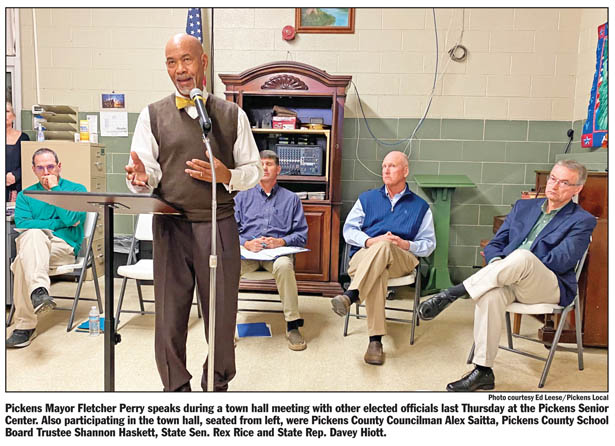Addressing the issues

Pickens elected officials participate in town hall
By Ron Barnett
Staff Reporter
rbarnett@thepccourier.com
PICKENS — About 70 people packed the Pickens Senior Center last Thursday night to ask questions to state and local officials on topics ranging from the teaching of critical race theory in schools to an increasing number of homeless people on the streets of Pickens.
The event, streamed live on the Pickens Local Facebook page, was the first “town hall” in recent memory that brought together elected officials who represent the city of Pickens at the various governmental levels — Sen. Rex Rice and Rep. Davey Hiott Pickens County Councilman Alex Saitta, Pickens County School Board Trustee Shannon Haskett and Pickens Mayor Fletcher Perry.
More than one questioner raised concerns about poor relations between businesses and the city and the Greater Pickens Chamber of Commerce.
One wanted to know why the city is paying a chamber official to handle special events.
Perry said the person in question operates a company that is separate from the chamber and that the city pays the company to provide services needed. The city has no authority over the chamber, he said.
Another business spokesperson also criticized that arrangement and cited a lack of communication between the city and businesses in general.
“The only time we see the city is if we do something wrong,” she said.
The mayor agreed that the city needs to do a better job of communicating with businesses. He said the new city administrator, Charlene Carter, plans to meet with all the businesses in town.
Local historian and business operator Barry Crawford made an impassioned plea for the city to save the dilapidated water tank that has been a landmark downtown since 1921.
The tank is believed to be in danger of collapsing.
“We need to keep history here in Pickens,” Crawford said.
Perry said the estimated cost of repairing the tank keeps going up and now is expected to hit the $500,000 mark. He favors tearing it down.
“If that tank falls, it would basically bankrupt the city,” he said.
The mayor, who is black, also had a different perspective on local history.
He recalled his youth in the late 1950s and said, “There were stores I couldn’t set my foot in — because of the color of my skin.”
Another person asked Haskett what the school district is doing to make sure the books that students use are “appropriate” and don’t espouse critical race theory.
The board recently banned a book that had been objected to for that reason.
Haskett said people often donate books to school libraries, and it’s difficult to know what’s in them all.
His answer was that the “culture” of the School District of Pickens County is “to do what’s best for the kids.”
Rice said the Legislature put a proviso in the state budget that bars schools from using state money for books teaching CRT.
He also noted that all the textbooks used in the school district are available for public review, but very few people take advantage of the opportunity to review them. Only four parents in the whole county did so in the most recent review period, he said.
A woman said she was irked by school officials who disagreed with her about a book she said taught erroneous racial information.
“I’m a little ticked off,” she said. “These educators are poisoning our children’s minds.”
Haskett thanked her for her efforts, which led to the board banning the book, and said, “The system will never be perfect.”
In response to a request for an update on the issue of protecting the scenic value of S.C. Highway 11, Saitta said he’s advocating an ordinance that would protect 1,000 feet on both sides of the highway from development, except for individual houses.
Litter was another issue of concern for several participants in the meeting.
One speaker quoted scripture in advocating for cleaner and better-mowed roadsides.
Hiott said the problem of overgrown roadsides can be attributed to the failure of a company that had contracted with the state to do the work. A new contract has been signed, and mowing should resume shortly, he said.
Also, Palmetto Pride, a beautification program that has been in limbo, “is fixing to get geared back up in all 46 counties,” Hiott said.
Rice said he “adopted” two miles on U.S. 123 just outside Easley to clean up himself. Among items he’s found along that stretch of road, he said, was $101 in cash.
But the issue of an increasing number of homeless people wandering the streets of Pickens seemed to generate some of the most unanimous concern among participants.
Rice and Hiott said homeless people are being bused in from other towns, particularly Greenville.
“They sleep anywhere they can find a place,” Hiott said.
“We’ve got to stop it,” he said. “From week to week, it gets more and more.”
“I’m as sympathetic as they come, but we’ve got to find a solution,” Hiott said.
“I’ve had some people say if they loot, we’ll shoot. We’ve got to get over that.”



























